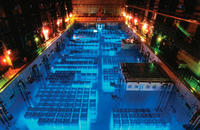-
Predicting wave power helps double marine energy

The energy generated from the oceans could be doubled using new methods for predicting wave power; researchers have devised a means of accurately predicting the power of the next wave in order to make the technology far more efficient, extracting twice as much energy as is currently possible
-
-
Loo turns poo into power
Researchers have invented a new toilet system that will turn human waste into electricity and fertilizers and also reduce the amount of water needed for flushing by up to 90 percent compared to current toilet systems
-
-
Recycling nuclear fuel offers plentiful, clean energy

Currently, only about 5 percent of the uranium in a fuel rod gets fissioned for energy in a nuclear reactor; after that, the spent rods, still containing about 95 percent uranium fuel, are taken out of the reactor and put into permanent storage; researchers say that recycling used nuclear fuel could produce hundreds of years of energy from just the uranium that has already been mined, all of it carbon-free
-
-
nCircle’s new solution offers coverage for six SCADA suppliers
Critical infrastructure is designated by DHS and the North American Reliability Corporation (NERC) as the assets, systems, and networks so vital to the United States that their incapacitation or destruction would have a debilitating effect on security, national economic security, and public health or safety; nCircle offers a security solution which covers vulnerabilities from six SCADA equipment suppliers
-
-
FTC charges businesses exposed sensitive information on P2P file-sharing networks
The U.S. Federal Trade Commission (FTC) has charged two businesses with illegally exposing the sensitive personal information of thousands of consumers by allowing peer to peer file-sharing software to be installed on their corporate computer systems
-
-
Forensic research using DNA sequencing technology
The Ion Personal Genome Machine (PGM) Sequencer translates chemical sequencing information directly into digital form by using semiconductor technology; it enables the analysis of ninety-six samples in one run, allowing forensic practitioners to obtain more information from the samples they process; the sequencer is suitable for a wide array of forensic identification applications, including missing persons identifications, mass disaster work, interpretations of complex mixtures, and bio-defense
-
-
Larger role for renewable energy in U.S. future than previously thought

Renewable electricity generation from technologies that are commercially available today, in combination with a more flexible electric system, is more than adequate to supply 80 percent of total U.S. electricity generation in 2050 while meeting electricity demand on an hourly basis in every region of the country; new study finds that renewable generation could play a more significant role in the U.S. electricity system than previously thought
-
-
Gun shop which sold gun to Virginia Tech killer closes its doors

Madison, Wisconsin-based online weapon dealer TGSCO, which gained notoriety after it was disclosed that it had sold guns to three individuals – including the Virginia Tech killer — who then went on to commit mass killings, closed its doors last month
-
-
New eight-sensor carousel sensor for perimeter, internal environments
FutureSentry shows its Carousel, a monitoring device offering 360 degrees of coverage through eight, adjustable, articulating sensor heads; its close-range detection capabilities allow for it to be deployed in internal environments
-
-
3-in-1 water monitoring system
All water treatment plants using membrane technology are required to be able to perform three processes to comply with international standards: identify whether there are any bacteria or contaminants; detect any broken membrane filters in the treatment plant; and pinpoint which filter is broken — accurate to 1 in 100,000 filters; a new, innovative device performs all three processes
-
-
Smartphone app offers sex offender information
Two of the providers of technology to local sheriffs’ offices have announced a new content publishing agreement that will offer the public information on sex offenders
-
-
New salmonella species food safety test kit
Salmonella is a genus of bacteria that are a major cause of foodborne illnesses throughout the world. The bacteria are generally transmitted to humans through the consumption of contaminated food; new salmonella test kit unveiled
-
-
Key to U.S. future prosperity: world-class research universities
American research universities are essential for U.S. prosperity and security, but the institutions are in danger of serious decline unless the federal government, states, and industry take action to ensure adequate, stable funding in the next decade, says a new report by the National Research Council; “The talent, innovative ideas, and new technologies produced by U.S. research universities have led to some of our finest national achievements, from the modern agricultural revolution to the accessibility of the World Wide Web,” says the chairman of the committee that wrote the report
-
-
Airport security screening technology market to grow
In 2011, TSA distributed approximately $437.1 million in contract obligations toward airport screening technologies; this amount is likely to grow in coming years as airport security authorities look for technology which would allow them to balance the requirements of tight security, on the one hand, and demands from the public for faster and less intrusive screening measures
-
-
Quick-curing concrete for infrastructure, mining disaster recovery
A quick-curing concrete can be sprayed to reinforce structures — buildings, runways, tunnels, bridges, dams – damaged by an act of terror or natural disaster; the spraying can be done almost immediately, before the structure fails catastrophically, providing safety for rescue workers who risk their lives minutes after disasters hit, and for still stranded in or near the damaged structure
-
- All
- Regional
- Water
- Biometrics
- Borders/Immig
- Business
- Cybersecurity
- Detection
- Disasters
- Government
- Infrastructure
- International
- Public health
- Public Safety
- Communication interoperabillity
- Emergency services
- Emergency medical services
- Fire
- First response
- IEDs
- Law Enforcement
- Law Enforcement Technology
- Military technology
- Nonlethal weapons
- Nuclear weapons
- Personal protection equipment
- Police
- Notification /alert systems
- Situational awareness
- Weapons systems
- Sci-Tech
- Sector Reports
- Surveillance
- Transportation
Advertising & Marketing: advertise@newswirepubs.com
Editorial: editor@newswirepubs.com
General: info@newswirepubs.com
2010-2011 © News Wire Publications, LLC News Wire Publications, LLC
220 Old Country Road | Suite 200 | Mineola | New York | 11501
Permissions and Policies
Editorial: editor@newswirepubs.com
General: info@newswirepubs.com
2010-2011 © News Wire Publications, LLC News Wire Publications, LLC
220 Old Country Road | Suite 200 | Mineola | New York | 11501
Permissions and Policies
